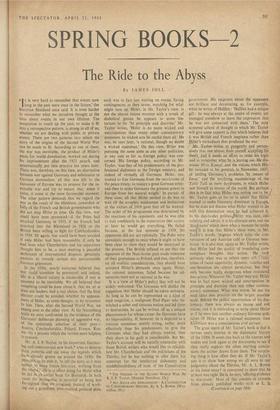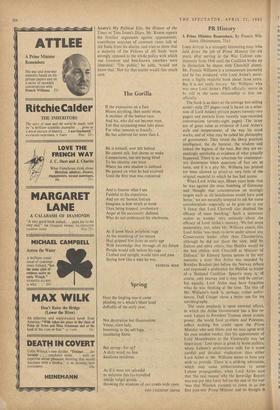SPRING BOOKS 2
The Ride to the Abyss
By JAMES JOLL
T. is very hard to remember that events now long in the past were once in the future,' the historian Maitland once said. It is even harder to remember what we ourselves thought at the time about events in our own lifetime. The temptation to touch up the past, to make it fit into a retrospective pattern, is strong in all of us, whether we are dealing with public or private events. There are two patterns into which the story of the origins of the Second World War can be made to fit. According to one of them, the war was inevitable, the product of Hitler's plans for world domination, worked out during his imprisonment after the 1923 putsch. and systematically put into practice ten years later. There was, therefore, on this view, no alternative between war against Germany and submission to German domination; all that was left to the statesmen of Europe was to prepare for the in- evitable war and try to ensure that, when it came, it came at the most favourable moment. The other pattern demands that we regard the war as the result of the blindness, cowardice or folly of the French and British governments who did not stop Hitler in time. On this view, war could have been prevented--if the Poles had attacked Germany in 1933, if the French had marched into the Rhineland in 1936 or the British been willing to fight for Czechoslovakia in 1938. Or again, war could have been avoided if only Hitler had been reasonable, if only he had been what Chamberlain and his supporters thought him to be, a man wanting a peaceful settlement of international disputes, genuinely anxious to remedy certain not unreasonable German grievances.
In the 1930s, nearly everyone believed that war could somehow be prevented; and indeed, life in a liberal society is intolerable if war is assumed to be inevitable. We all believed that something could be done about it, that we. or at least our leaders, had a real choice, that the final disaster could be avoided, whether by appease- ment of Hitler, as some thought, or by resistance to him. Then, after the Second World War, we swung over to the other view. At the Nuremberg trials we were confronted by the evidence of the Germans' deliberate planning of aggressive war, 01 the systematic selection of their prey— Austria, Czechoslovakia, Poland, France, Rus- sia—by a process which the victims were helpless to prevent.
Mr. A. J. P. Taylor, in his important, fascinat- ing and controversial new book,* tries to destroy these patterns and cut away the legends which have already grown up around the 1930s. He attempts, as he puts it, `to tell the story as it may appear to some future historian, working from the record.;.' He is in effect doing for Hitler what he did in an earlier book for Bismarck. In both cases the protagonist is revealed as being less
• far-sighted than we imagined. Instead of work- ing out a grandiose, preccmceived political plan,
each was in fact just waiting on events, facing government. His epigrams about the appeasers contingencies as they arose, watching for what are brilliant and devastating, as, for example, might turn up. Hitler, in Mr. Taylor's view, is when he writes of Halifax: 'Halifax had a unique not the almost insane monster with a streak of gift: he was always at the centre of events, yet diabolical genius he appears to some his- managed somehow to leave the impression that was, he says later, 'a rational, though no doubt Hitler's wickedness that produced the war.
pursuing the same aims as any other politician, sively that one almost finds oneself accepting his at any rate as far as foreign policy was con- thesis, and it needs an effort to resist his logic rational statesman merely trying. rather more Eichmann was a conscientious civil servant.
*THE ORIGINS OF TIIE SECOND WORLD WAR. By A. J. P. Taylor. (Hamisli Hamilton, 255.1
t ALL SOUI.S AND APPEASEMENT: A CONTRIBUTION TO CONTEMPORARY HISTORY. By A. L. Rowse, (Mac- millan, 18s.)
torians to be. 'In principle and doctrine,' Mr. he was not connected with them.' The only Taylor writes, 'Hitler is no more wicked and accepted school of thought to which Mr. Taylor unscrupulous than many other contemporary will give some support is that which believes thaf statesmen. In wicked acts he outdid them all.' He it was British and French ineptness rather than .
the peace treaty; to restore a great German army; Table Talk as mere daydreams, in which Hitler and then to make Germany the greatest power in saw himself as master of the world. But perhaps , Europe from her natural weight.' In pursuit of this is in fact what Hitler was setting out to be.!
the process. The British refused to see that the that Hitler had the quality of translating corn- signature of the Nazi-Soviet pact made nonsense monplace thoughts into action. 'He took of their guarantees to Poland, and that, therefore, seriously what was to others mere talk.'/ DS& on all realistic considerations, they should have trines of racial superiority, dynamic violence and accepted Hitler's demands once again. Hitler, anti-Semitism are always pernicious: but they the rational statesman, failed because his ad- only become really. dangerous when translated versaries were not as rational as he was. into action. Whatever Mr. Taylor may say, Hitler It is a view of Hitler's policy that will not be was in fact more wicked and unscrupulous in widely welcomed. The Germans will dislike the principle and doctrine than any other contem- suggestion that Hitler should be taken seriously. porary statesman. What was worse, he put his As long as he can be represented as a kind of mad ideas into practice on the largest possible mad magician, a malignant Pied Piper who be- scale. Behind the skilful opportunism of his dip- witched a sober and virtuous nation and led them lomacy. there was always an insane and evil to destruction, he can be written off as a unique vision; and it is misleading to write about Hitler phenomenon for whose career the Germans have :v if he were just another ordinary German poll- no responsibility. If, however, he is depicted as a tician. 'If Hitler was a rational statesman, then effectively than his predecessors, to give the The great merit of Mr. Taylor's book is that it Germans what they had always wanted, then revives one's interest in the diplomatic history their share in his guilt is considerable. But Mr. of the 1930s. It sends one back to the sources and Taylor's account will be equally unpopular with makes one look again at the documents to see if
those British writers who would like to rehabili- they really support the often startling conclu- tate Mr. Chamberlain and the politicians of the sions the author draws from them. The surpris-
Thirties, for he has nothing to offer them but ing thing is how often they do. If Mr. Taylor's contempt for the intellectual dishonesty and aim is to show how wrong we all were in our nuiddleheadedness of most of the Conservative judgments about the Thirties, Mr. A. L. Rowse in his latest essayt is concerned to show that he at least was right. He is, he says, 'offering evidence to historians.' Most of this consists in extracts from already published works such as L. S.
(Continued on page 564)
Amery's My Political Life, the History of the Times or Tom Jones's Diary. Mr. Rowse repeats the familiar arguments against appeasement, contributes snatches of common room talk at All Souls from his diaries, and tries to show that a majority of the Fellows of All Souls 'were strongly opposed to the whole policy with which our foremost and best-known members were identified.' The public,' he adds, 'would not know that.' Nor for that matter would they much care.















































 Previous page
Previous page